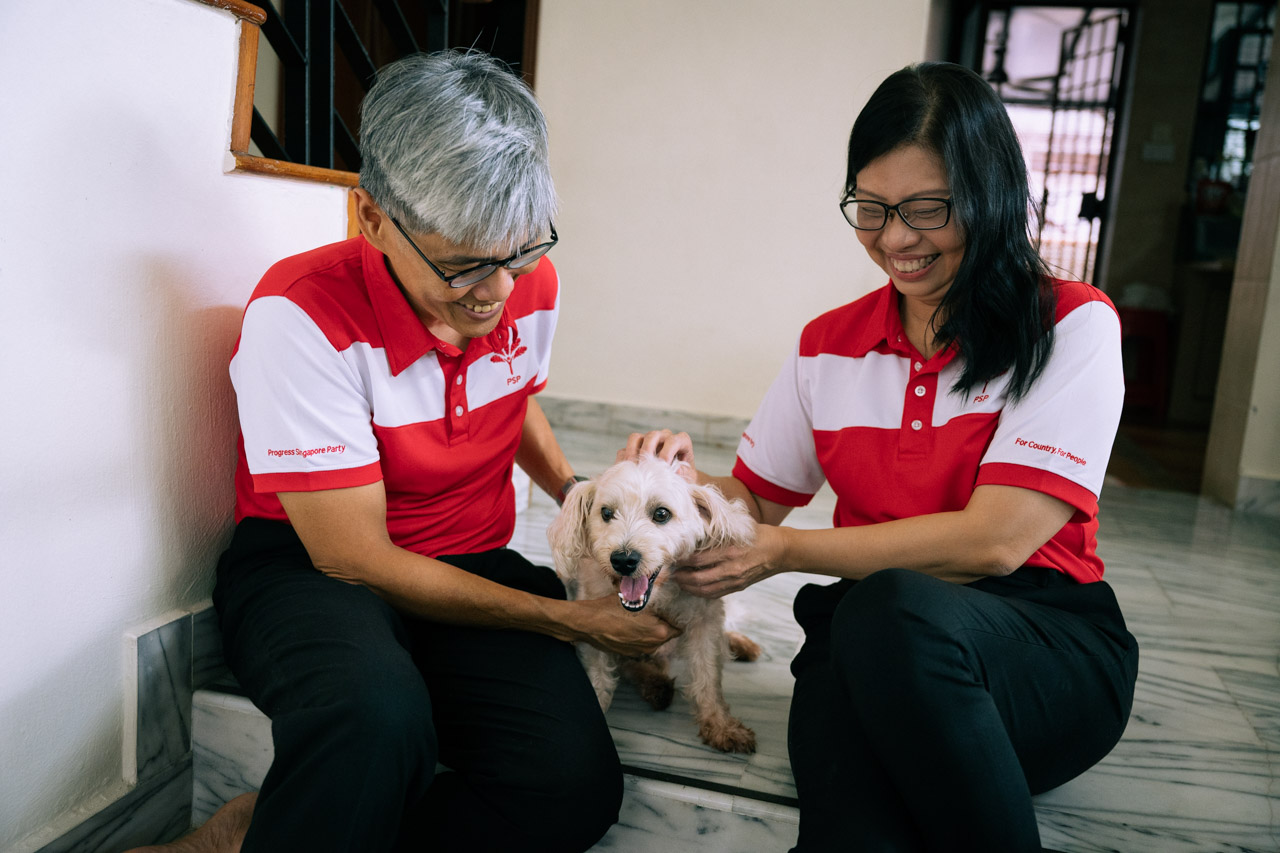RICE does not endorse any political party in Singapore. Refer to our GE2025 content coverage policy for details.
All images by Justin Tan for RICE Media.
It’s day three of the GE2025 campaign period, a Friday. Hazel Poa and Tony Tan Lay Thiam—who you might know as Progress Singapore Party (PSP) candidates—welcome me to their home.
They have a dog. He is as small as he is affectionate. The campaign period has been the hardest on Potter the dog, who now spends his days wondering where his owners have gone. Such are the sacrifices GE2025 demands.
As my photographer sets up his equipment, Tony offers to help him check the lighting of the shot with some test poses.
“You can wait in the shade,” he tells Hazel. “It’s very hot here.”
Hazel and Tony, both 54, seem to like each other a lot—which is good, because they’re husband and wife. They are almost identically sized, with a subtle case of ‘couple face’ that you can’t really pick up on until you meet them in person.
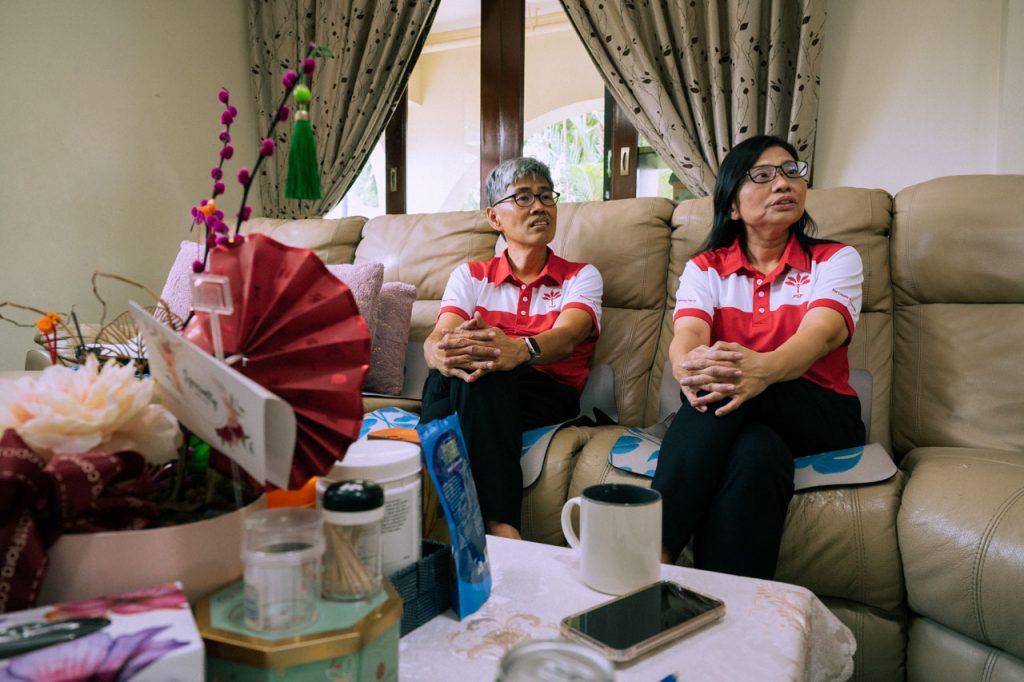
I imagine they must have once looked very different when they first met as students in Cambridge University, before proceeding to spend the next 36 years morphing into genderbent copies of each other.
Now, in 2025, Hazel (part of the PSP team for West Coast-Jurong West GRC) and Tony (the PSP candidate for Kebun Baru SMC) are united in both looks and purpose: To win their seats in Parliament, and to continue advancing the opposition cause in Singapore.
But this is far from their first rodeo. For Hazel and Tony, their political love story has been 16 years in the making.
Then and Now
I ask: “You joined the Reform Party in 2009, right?”
“It’s not important,” Tony demurs. We laugh.
They first stood for election in GE2011—long after their marriage in 1994—under the National Solidarity Party (NSP)’s banner in Chua Chu Kang GRC.
(Amusingly, with all the redrawn electoral boundaries since then, some of Hazel’s would-be constituents in GE2025’s West Coast-Jurong West GRC were also her would-have-been constituents in GE2011’s Chua Chu Kang GRC.)

I attempt to pry their thoughts on the party swaps they’ve made over the years. They joined the Reform Party (RP) in 2009 before departing for the NSP in 2011. Then they moved to the PSP in 2019, where they’ve stayed since.
Entering politics was Tony’s idea. But the choices that came afterwards—leaving parties, joining parties—were all made jointly.
They remain coquettish about their past with the RP and NSP. Jointly, as many of their answers are, they say they never even planned to be political candidates. In 2009, they didn’t put much deep thought into the specifics of the party they joined—all they thought about was lending their strength to whatever opposition existed.
Advancing the opposition cause was their “macro-level motivation”, Hazel says.
“But along the way, we talked to the residents and slowly got to see the issues that actually affect their lives—that gained importance subsequently.”

Their political evolution has been a total reverse of how other candidates usually describe it—most candidates have one micro-issue that inspired them to step up for political office.
Hazel and Tony, however, went top-down instead; they loved the institute of opposition politics first, and then got into the gritty day-by-day stuff of grassroots work.
“Back in 2009, there was much less political discourse,” Tony offers.
“There was very much a culture of fear. Now, 16 years later, it’s more open. People feel they need to be heard. But I don’t know if it’s because the country’s matured politically, or whether people now feel their concerns aren’t being addressed.”
Hazel and Tony seem vicariously troubled by whatever ails the residents they speak to. I feel troubled listening to them. The only untroubled people in this house must be their sons, who are nowhere to be seen during the interview—a basketball hoop in their garden is the only obvious indicator that teenage boys live here.
Their sons, aged 17 and 18, have been party (ha!) to their parents’ political careers from the start. It’s also their 16th year witnessing their parents’ political careers.
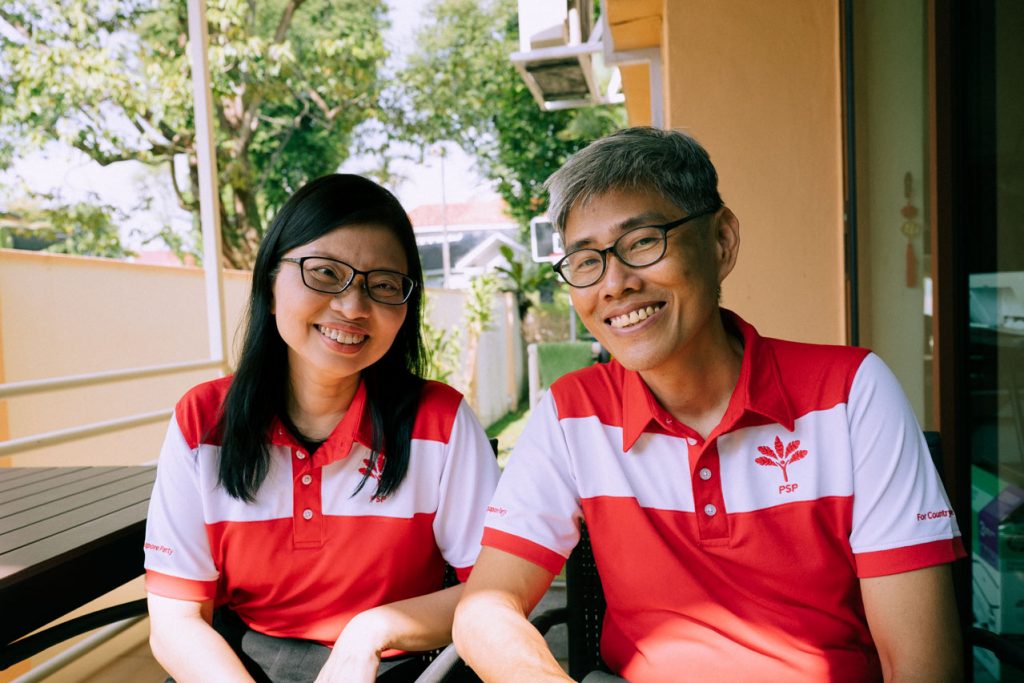
Right now, the siblings are more preoccupied with hanging out with their friends than their parents—Hazel and Tony concur that their sons aren’t too interested in Singapore politics for now.
I suppose it’ll come with time. When the next GE rolls around, both will be old enough to vote.
And what if their sons voted for the PAP in the next election?
Hazel and Tony stare at me for a second.
Stiltedly, they say: “Well, it’s a democracy, so…”
NCMP Blues
There seems to be an implicit understanding between the two that Hazel has a better chance of winning her seat, if only because of her Non-Constituency Member of Parliament (NCMP) term. GE2020 saw Hazel appointed as one of the two NCMPs in the 14th Parliament of Singapore. The other was fellow party member Leong Mun Wai.
NCMPs are picked from the pool of best-performing losers at the GE—if and only if there are fewer than 12 elected opposition MPs. They vote and debate on the same matters as MPs.
Hazel’s come a long way throughout her five-year term; some standout moments she highlights in our conversation include her motion to abolish GRCs and her motion to suspend then-Transport Minister S Iswaran from Parliament.
I’ve seen her pop up on my social media feeds more and more frequently over the years. Either it’s a speech people agree with, or an intra-Parliament spar. If people didn’t know her name before her NCMP stint, they most certainly do now.
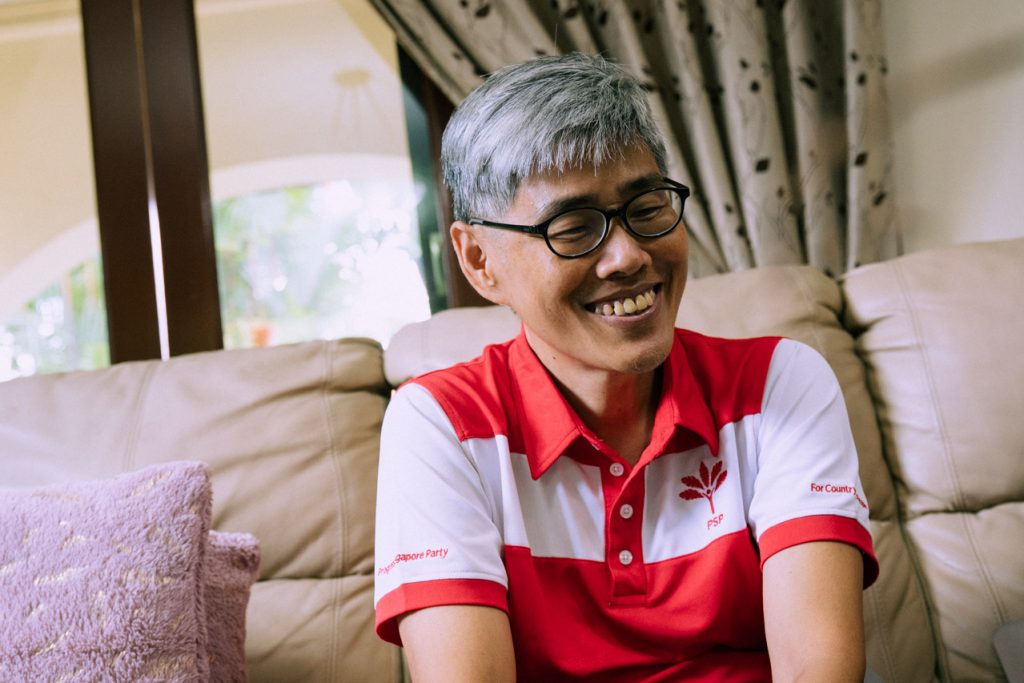
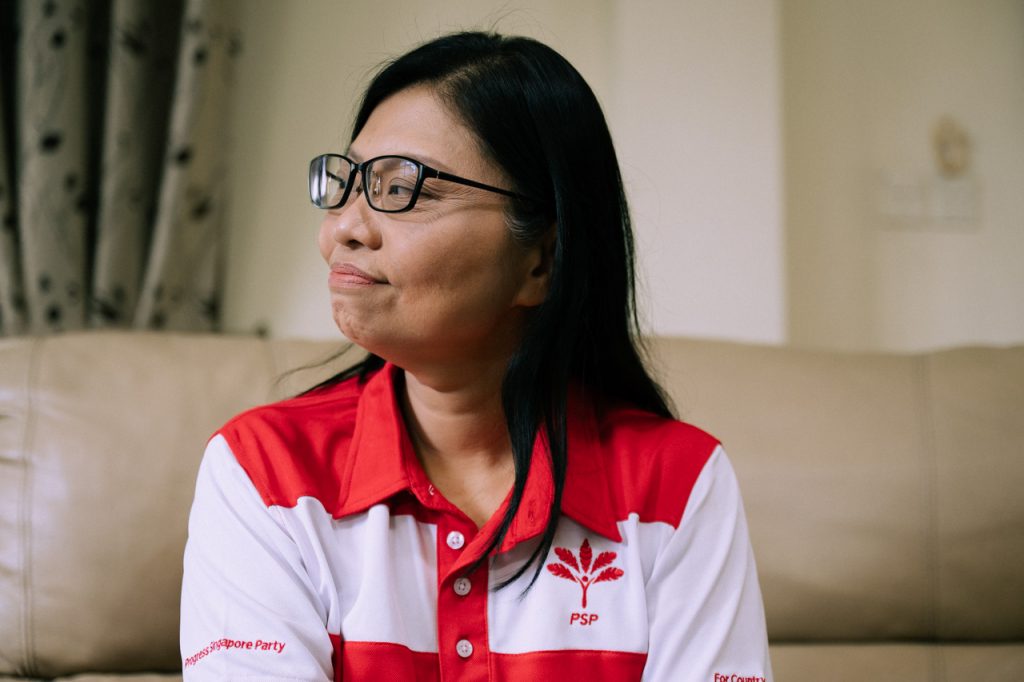
I ask if she sees the things people say about her online. She has, both the good and the bad.
“When we find that what we’re saying resonates with people, that really helps. Otherwise, Parliament can be quite a hellish journey. You need these energy boosts to carry on,” she says.
Five years of parliamentary experience later, Hazel is back to fight for a seat at the table again.
As an elected opposition MP, her speaking and voting rights in Parliament will differ marginally from those of an NCMP. For Committee of Supply cuts during budget debates, she’ll get 20 minutes instead of 18 minutes.
The real difference lies outside of Parliament. If she’s elected, she gets to have constituents—as an NCMP, she obviously didn’t have any (hence the ‘NC’ part of it).
She says becoming an MP will give her resources that she can extend to her constituents—things like having venue spaces open to her, and other logistical things that become easier when you run the Town Council.
Her campaign materials focus on big-picture issues such as opposition representation in Parliament. Fostering a strong political opposition in Singapore is clearly her pet topic, if her GRC-abolition speeches and rally speeches are any indication.
It doesn’t stop her from keeping her ear to the ground, though. In urgent tones, she talks about the problems residents have. Specifically, how they differ from the problems they used to have.
“14 years ago, [residents] used to talk about not having enough food options, or not enough bus services. Now, they’re worried about jobs and the cost of living.”
For the past five years, she’s balanced doing neighbourhood walkabouts with her day job, but there’s always a limit to how many residents she can talk to, she says.
In the event that they win their seats, Tony and Hazel have discussed quitting their jointly-owned business—Smartlab Education Centre, a chain of tuition centres—to become full-time MPs.
There isn’t enough time otherwise. Hazel says she “feels the strain all the time” because there’s always so much to do—even in her relatively reduced capacity as an NCMP.
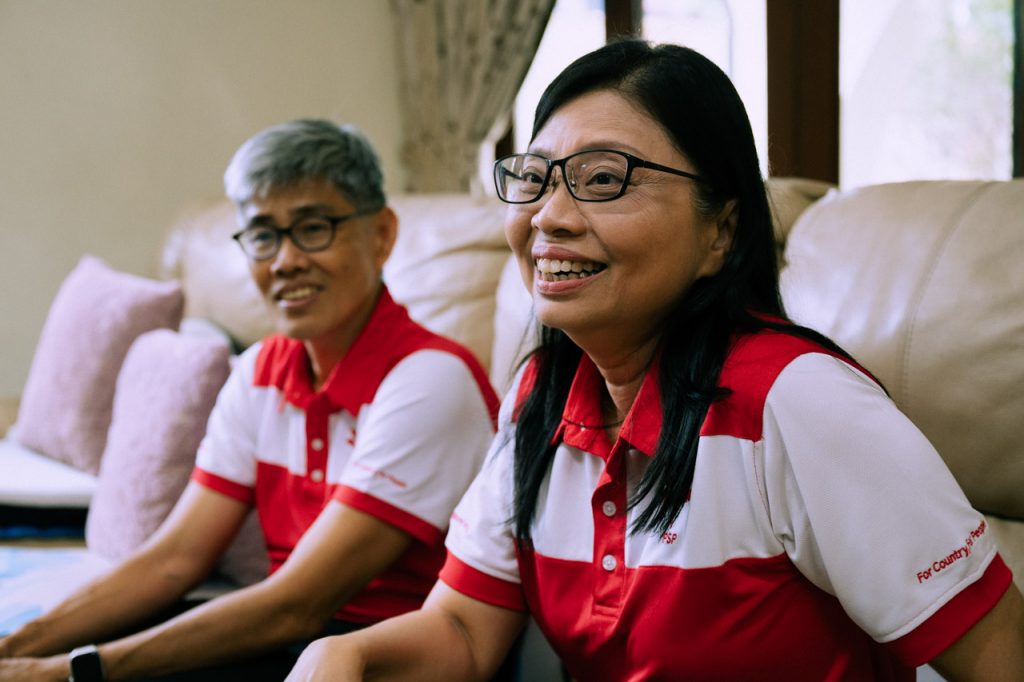
“Sometimes, I wonder,” Hazel muses, “How in the world do elected MPs do this part-time?”
Hazel’s background is in mathematics, so she’s most comfortable with numbers. I can tell.
Throughout the interview, she recalls statistics and figures with sickening speed. She’s well aware of her numerical dexterity—it’s one of her unique strengths as an NCMP and potential MP, she says.
“English was my worst subject in school. I hated writing essays,” she adds.
And then she became an NCMP, where it felt like her main job was to write essays and discuss them in Parliament.
It took time getting used to. But with the help of her own party’s researchers, speechwriters, and the Parliament Secretariat themselves, things worked out.
It’ll always be scary, Hazel says, but you’ve just got to jump into the thick of it. Even if you feel like you aren’t ready, you’ll probably find that you can do it.
But that’s essay writing. What about being an MP? Is Hazel Poa ready for that?
“Yes,” Hazel says. She’s nodding so hard that I feel compelled to nod along.
“I’ve been getting ready for so many years.”
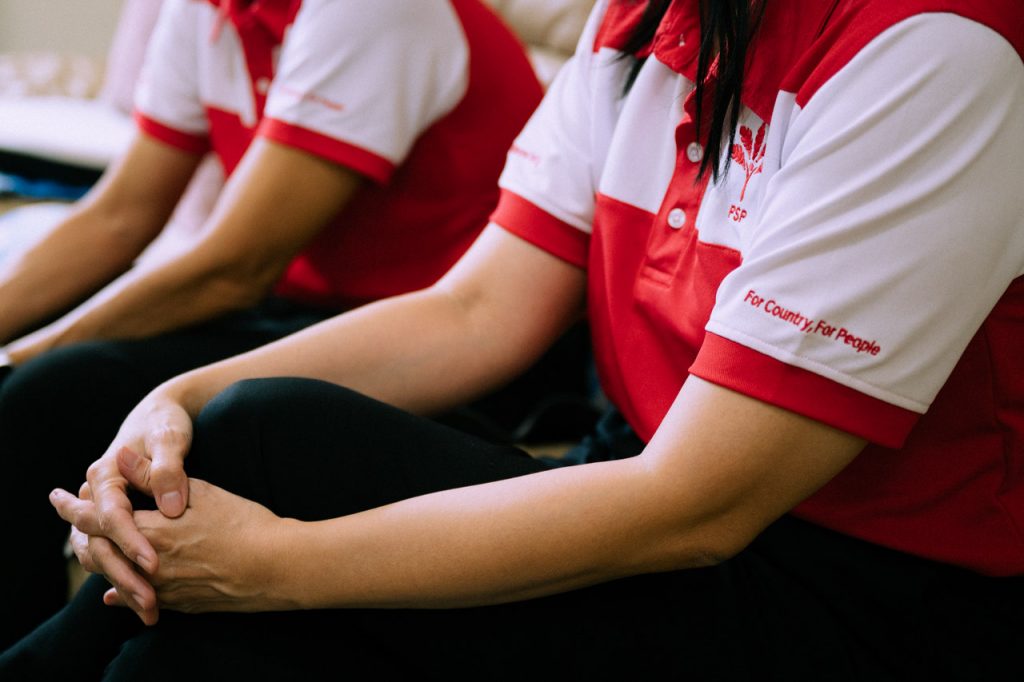
‘Hazel Poa’s Husband‘
After Hazel’s five-year NCMP stint, it’s possible most people hearing of Tony this election may know him best as ‘Hazel Poa’s husband’. How does he feel about that?
“Oh, that’s fine,” Tony laughs.
“Being known as Hazel Poa’s husband is great.”
He says: “Really, it’s more about the PSP and furthering the party’s platform. If people want, they’ll ask who the candidate is, and that’s where I introduce myself.”
Hazel jumps in. “I think everyone goes through this stage.”
By “this stage”, she means the period in politics where you’re known only in relation to someone else. For Hazel, this was when she was first appointed as an NCMP.
“When [Leong Mun Wai and I] were first appointed as NCMPs, people would say: ‘Oh, you’re from Tan Cheng Bock’s party, right?’ We were known only as ‘Tan Cheng Bock’s people’ at first,” Hazel says.
“Then we got the opportunity to be in Parliament and show people who we were. After a while, they knew our names—we were no longer just ‘Tan Cheng Bock’s party members’.”
The day Hazel felt she’d stopped being just ‘Tan Cheng Bock’s party member’ and crossed over into making a name for herself was when she filed the motion to suspend then-transport minister S Iswaran from Parliament.
“That was when more people started coming up to me to talk.”
She believes the same shift can happen with Tony.
Maybe he’s ‘Hazel Poa’s husband’ today. Tomorrow, who knows?
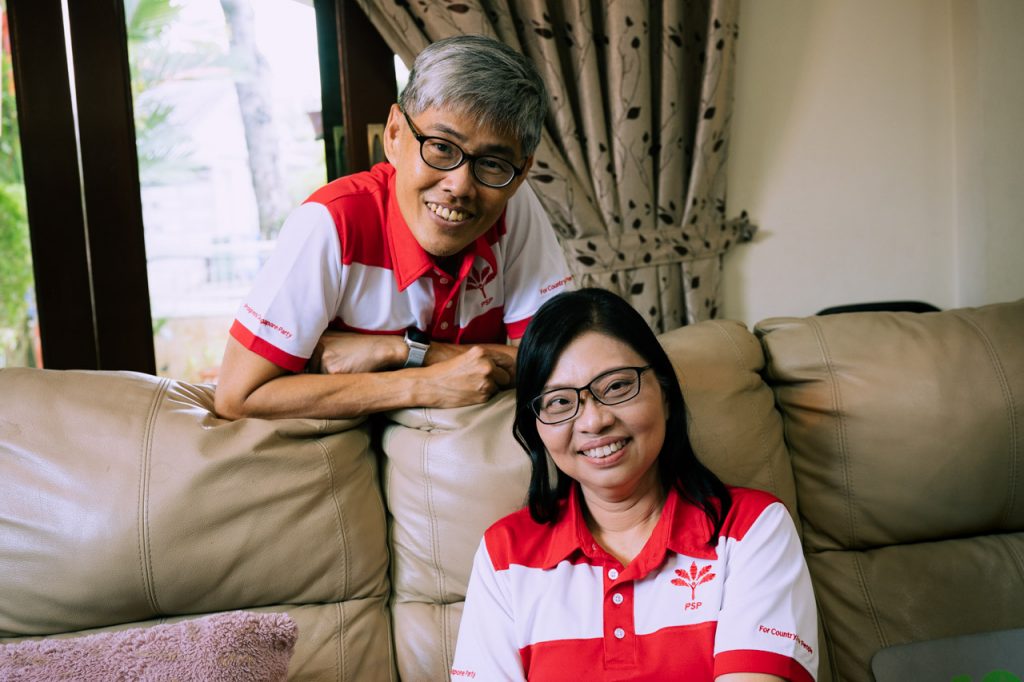
Besides being a supportive husband, Tony is also an engineer by training. He makes no secret of the fact that he is a geek—he has a robot dog that’s even joined him on the campaign trail. But, like Hazel, his true passion seems to be politics and social issues.
In his campaign material, Tony wants to start programmes to help students and the elderly. In person, he worries about HDB prices and empowering young people.
Tony finds out that my photographer, Justin, and I are in our early twenties. Consequently, he asks relentlessly for our opinions on HDB prices and employment prospects. He has a generally relaxed demeanour, but his brows knit together with frustrated intensity when he talks about “the next generation” (my generation!) and the issues we face.
And he might be soft-spoken, but he’s not one to shy away from questioning the ruling party. He’s been trying to get his Kebun Baru SMC opponent, PAP’s Henry Kwek, to agree to a policy debate, to no avail.
His political identity definitely isn’t as distinct as his wife’s. At least, not yet.
But it was Tony who first floated the idea of joining politics to Hazel all those years ago. And a person looking to join opposition politics in 2009 must be a man of some conviction indeed.
Hazel & Tony
It can’t be overstated that Hazel and Tony really do work well together.
Throughout our conversation, they swoop in to buttress each other’s answers—sometimes, it’s Tony furnishing Hazel’s claims with hard evidence. (This happens when Hazel recalls a parliamentary debate with Manpower Minister Tan See Leng; Tony supplies the exact year the debate in question occurred, along with the exact details of Hazel’s argument.)
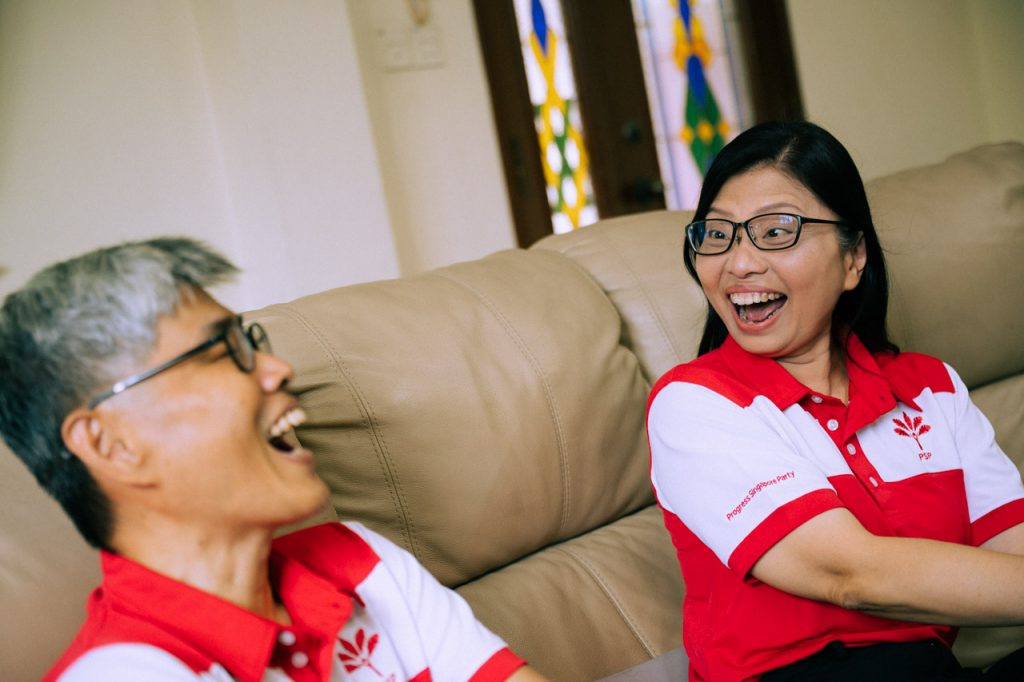
Other times, when Tony gets lightly self-effacing like he did with the ‘Hazel Poa’s husband’ question, Hazel steps in to soften the impact of his words. They might not be standing in the same GRC team this GE, but they don’t have to. They watch out for each other regardless.
“I was really happy for her when she was first appointed as an NCMP,” Tony says. “They’ve [Hazel and fellow NCMP Leong Mun Wai] pushed the boundaries.”
Then, he rattles off a list of statistics about Hazel and Leong Mun Wai’s tenure in Parliament as NCMPs—they fielded over 700 parliamentary questions, filed 14 motions, and some other numbers I don’t immediately catch.
I’m well aware this is a political candidate’s rehearsed answer—these numbers feature prominently on PSP campaign material.
But with the way Hazel looks back at him? Wow. This feels like a husband appreciating his wife in their own exclusive love language. Acts of Service? Words of Affirmation? Tony and Hazel have Reciting Your Spouse’s Parliamentary Statistics.
“I’ve seen how she’s struggled. It’s really not easy to be in her position,” Tony says. “We’d take much longer than just this interview to tell you everything.”
The enormity of GE2025 isn’t lost on them, but they don’t seem to let it engulf them. Part of it is because they’ve been candidates before. They know exactly what to expect.
And in the event that only one of them wins, it’s still a them thing.
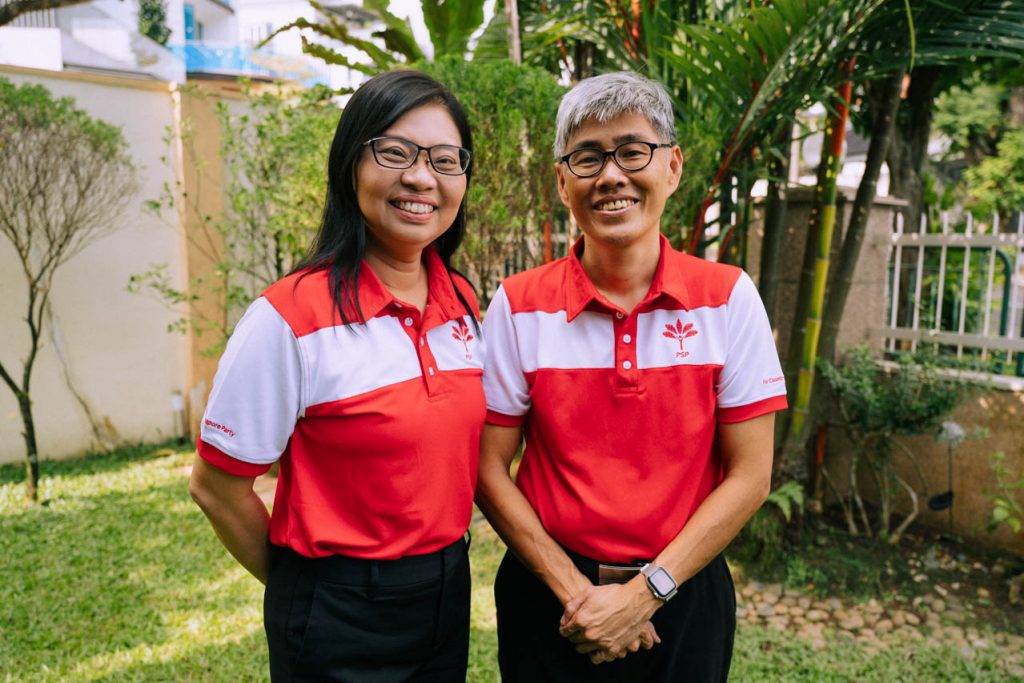
They entered politics together to further the opposition cause. 14 years on, they’ve amassed grassroots experience and Parliamentary tenure to back up their shared dream of a strong opposition in Singapore.
Will their conviction stand up at the polling booth? We’ll know in a few days.
“Two parents in Parliament,” I say, thinking out loud about what it could mean for them and their family.
“‘Two parents’ is a bit premature to say,” says Hazel.
And then she and Tony chorus: “Maybe it’ll be zero!”
The Right People
Tony walks me and my photographer out of their home and to their front gate.
He pauses by their letterbox to check for mail. He flips it open and peers in. There’s a white envelope inside, the words “IMPORTANT: Poll Card(s) inside“ printed neatly on top.
In less than a week, everything could change for this household. They might be up one Parliamentarian (or two). They could be the faces of a burgeoning opposition wave.
Or they might wind up as casualties in the ruling party’s mandate-seeking exercise.
Tony, in talking about Hazel’s NCMP career, takes pains to warn me and my photographer: “People are what make things hard. And politics is all about people.”
It’s good to know that these people will always have each other: Hazel, Tony, and their sons. (And Potter the dog.)
“Hazel,” Tony calls, “The voting cards are here.”

